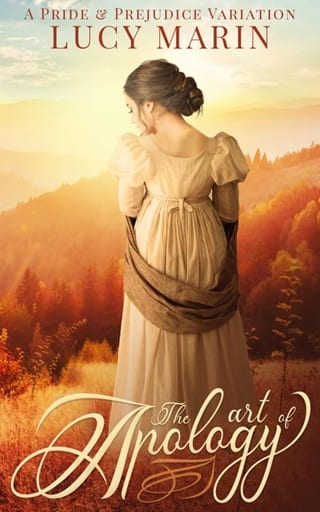Chapter 9
CHAPTER NINE
F rom Elizabeth’s perspective, the dinner party at Longbourn had gone as well as possible. She had been pleased to see her friends, and while her mother had made too much of Mr Bingley, none of her flattering comments, not even her over-enthusiasm, had stopped him from admiring Jane. The couple had spent most of the evening together, and before retiring that night, Jane had shyly admitted to Elizabeth that she liked him more than any other gentleman she had ever met.
Before breakfast the following morning, Elizabeth sat and drank a cup of tea with her father. He asked whether she had enjoyed the event, to which she replied in the affirmative.
“I was glad to see you avoided Mr Darcy,” he said.
Elizabeth laughed. “He made it easy by avoiding everyone apart from his friends. My mother will be satisfied with the evening. I expect she will want to talk about it extensively at breakfast with much to say about the many, many looks Mr Bingley gave Jane and how they made her blush. She will be very happy that her daughter is winning the contest to secure Mr Bingley’s attention.”
To her surprise, his expression was not amused as it usually would be; rather, he seemed displeased, perhaps even admonishing. “Your mother works hard to ensure our guests are comfortable, and she wishes only the best for you girls. Granted, she could show a little more discretion—she hardly knows Mr Bingley—but I appreciate the impulse behind her actions. You should not be so quick to laugh at her, Lizzy.”
She attempted to hide the colour that must surely be covering her cheeks by bending over her cup and taking a long, slow sip.
“Do not mind me,” he said after a brief pause. “I did not sleep well.”
“I am sorry to hear that, Papa.” Looking at him more closely than she previously had, she saw that his eyes were heavy and partly closed. “What are your impressions of the evening? I thought dinner was excellent, particularly the chicken.”
Mr Bennet gave her a small smile. “Yes, the meal was excellent. I spoke to Mr Bingley and thought he was amiable, as you told me, but I am not yet convinced. Tell me, what would you do to…encourage Mary to embrace society more? I worry she is too sombre and will become more withdrawn if something is not done soon.”
Despite her efforts to conceal her astonishment at the question, she could not entirely keep it from her voice as she said, “I do not know.” Seeing him watching her, waiting impatiently for more, she finally added, “I would try to convince her not to compare herself to her sisters, especially not to Jane and Lydia. My mother considers Mary the least pretty of us, and she knows it. I cannot say with certainty, but I have wondered whether she uses her studies as a way to distinguish herself from us. She is the serious one, prepared to dedicate her days to sober reflection and music, whereas the rest of us prefer less demanding pastimes and livelier tunes. And-and…”
She exhaled noisily. “I believe she wants to ensure no one views her as they do Kitty and Lydia, silly girls who spend too little time thinking of matters beyond their appearance and how many men favour their company.”
“And reading so seldom, it makes people wonder whether they know how,” he interjected. “I doubt either of them has voluntarily opened a book this year.”
She nodded and observed him closely, not quite optimistic that he intended to act on her information. “Jane and I both feel Mary has become worse since Lydia entered society.”
Her father averted his eyes and began to nod. As though speaking to himself, he said, “Yes, there might be some truth in that. I must attack both fronts at once.”
“Pardon me?”
“Nothing, nothing.” He still did not look at her and shortly waved a hand towards the door. “Were you not going for a walk, my dear?”
Taking that to mean he wished to be alone, Elizabeth stood, placed her empty cup on the tray, and left the book-room .
The next occasion Elizabeth would have to see Mr Darcy was on Friday when she and her family were spending the evening at the home of Mr and Mrs Best. She was not certain he would be there, although she knew the Netherfield party had been asked. Mrs Best told them so when she called on Tuesday. She spent the entire twenty minutes she was at Longbourn telling them how much her son, Edward—who had not been at the assembly due to ill health—was looking forward to meeting Mr Bingley and Mr Darcy but most especially to seeing Elizabeth again. It was almost enough to make her wish for her own bout of ill health.
There was nothing wrong with Mr Edward Best, other than his conversation was lacking, he had little sense of humour, and he was not particularly handsome. However, that spring, he had decided he liked her above all other young ladies, and his mother seemed to believe Elizabeth ought to be flattered by his infatuation with her. She was not. Mr Bennet had already informed the Bests that they should have no expectations that a match between her and the young man would be met with approval, but it had not made any difference to his or his mother’s deportment towards her. No doubt, her father had treated the matter partly as a joke, thus making it easy to overlook his warning.
As for Mr Darcy, Elizabeth admitted to being curious whether he would attend the party. Given how disdainful he was whenever she saw him, she rather expected to hear that he had returned to town or wherever his estate was. If he was at Lane Park, would he continue to act as poorly as he had every other time she had seen him? Was it possible he might decide to embrace his present situation and attempt to make friends? The thought made her snigger. It was exceedingly unlikely that Mr Darcy knew how to undertake such a task. And it would be difficult for him, given he has offended everyone in the neighbourhood. I doubt he would be willing to make the effort! The thought of all the apologies involved would surely make him faint.
She also wondered how her father would behave. It was surprising enough that he insisted he would go with them—he usually preferred to stay at home to ‘revel in the quietness when Longbourn is free from all you women’, as he often said—but then a brief conversation with Mary early that morning added to her shock. Mary came to her chamber while she was preparing for a walk.
“I cannot believe I am saying this, but my father has encouraged me to dress my hair differently tonight,” Mary said, her eyes wide and slowly shaking her head. Gesturing to the sides of her face, she continued. “He mentioned the way you always have curls. I told him I thought it would not suit me, but he thinks it will. Has he ever spoken to you of such a thing?”
“No,” Elizabeth replied, drawing out the word as she recalled their discussion the previous day and the conversations she had overheard him having with her younger sisters. It was difficult to believe he truly intended to take a hand in, well, improving them was the only way she could explain it. Yet, it seemed that he did.
“Why would he begin now?” Mary sounded alarmed. “Does he expect me to adopt such a coiffure? You agree that it would look horrible on me, do you not? ”
“For questions one and two, I cannot say.” Though I would like to know, especially regarding the first! “As for it suiting you…” She ran her fingers through a strand of Mary’s hair. “I fear it is too fine to hold a curl, but together with our maid, we might arrange it in a way that both he and you would approve of.”
“But—”
“Think how it will please Papa,” Elizabeth said gently. “You are very pretty, Mary, and I would very much like everyone to see it—you especially. Now, you sit here and let me play with your hair for a few minutes. Do you remember when you, Jane, and I used to do that, when we were all still in the nursery?”
Her walk forgotten, Elizabeth spent the next while with Mary, ultimately settling on more than just how she would arrange her hair for the party; they also adjusted her costume to add more colour. The changes were subtle but enough for their mother to remark that Mary looked very well when the family gathered for dinner. What Elizabeth would remember most was her father’s satisfied expression.
Arriving at Lane Park, Elizabeth saw at once that Mr Bingley, his family, and even Mr Darcy were there. All three Bests greeted them, after which, the Bennets went in various directions. Mr Bingley was at Jane’s side almost before she was rising from her curtsey, and Mr Edward Best insisted Elizabeth take his arm so that he might escort her farther into the room, where he promised to show her the refreshments laid out along one wall.
“My mother has arranged for us to be entertained by musicians from Hertford. I do not know exactly how many there are—two or three. Oh, and a singer. You play and sing so well and will find it diverting, will you not? I told Mama you would. We shall have a hot supper later on too,” he assured her. “Listening to music always makes me so hungry. Is that not odd? It is the same when I see any sort of performance. Mama has arranged a feast. Would you like anything now? A drink perhaps? Wine? Punch?”
“No, thank you,” she said before he could go on. She managed to extricate her arm gently from his and looked about the room, hoping to spot one of her friends. It would provide her with an excuse to separate herself from him; she did not want to encourage his belief that she might develop a tendre for him. It was saying something that even her mother, who longed to see all her daughters married as soon as possible, did nothing to promote the match. “Oh, there is Charlotte. Please excuse me, Mr Best. I must ask her something.”
Before he could respond, she left, trusting that the growing crowd of guests would prevent him from following her.
Soon, they sat down to watch the small musical ensemble. It had clearly been Mrs Best’s intention that Elizabeth and her son might sit together, but Elizabeth carefully avoided both and slipped into a chair where she was partly hidden from view. There was a draught, and she was glad for her wrap, which she pulled tightly across her shoulders. Soon, she was engrossed in the performance and any discomfort was forgotten.
Until she noticed Mr Darcy watching her .
He was sitting across the room, his position perfect for seeing her with few obstructions. What did he want? No doubt he was finding fault with everything about her—her looks, where she was sitting, the expressions on her face as she listened to the various pieces. He is the most vexing man I have ever had the misfortune to meet! She did her best to pretend he was not there, even leaning this way or that so it was more difficult to see him, telling herself it was part of the promise she had made her father to avoid him.
Mr Darcy’s examination did not end after the musicians had finished. There was an interval before supper, and as she spoke to different people—Mary, followed by some acquaintances—she spied him turned towards her. Twice it seemed that he intended to approach, but she moved elsewhere, knowing it would make it difficult for him to find her, given the size of the room and the number of people.
Why will he not admit that I do not wish to talk to him? It occurred to her that she was mistaken, that he had no desire to be in her company, and any time she had seen him looking at her it had only been to ensure he did not accidentally find himself close enough that he was obligated to exchange a few words with her. Not that he feels it is necessary to abide by the social niceties!
If she had been of a more liberal mindset, she would remark that he might be making an effort to be pleasant this evening. When he had dined at Longbourn, just two days ago, he had largely stood apart from the other guests when they were in the drawing room, and she doubted he had said much to his companions at the table. Tonight, he was speaking to her neighbours—not just his friends—and while he did not smile or laugh or even look particularly engaged by the exchanges, it was possible he was attempting to be polite. Regardless, one person with whom he would not converse was her!
Her good fortune ended about twenty minutes later. Mr Edward Best had found her and was sharing his impressions of the music while she listened with growing impatience when Mr Darcy joined them.
“Miss Elizabeth,” he said, offering her a slight bow.
“Mr Darcy, how did you like the performance?” Mr Best asked, saving her from having to address the gentleman. “I was just telling Miss Elizabeth that I thought it one of the finest I have ever seen.”
“Did you? How…interesting. And you, Miss Elizabeth, what is your opinion?”
She shrugged and opened her mouth to make an excuse to leave them, but before she could, Mr Best again spoke. His lack of manners made her wonder whether perhaps he had imbibed a little too much wine or whether his recent illness, and thus absence from company, had left him over-eager for people other than his parents to speak to.
“Miss Eliza is an excellent singer. Have you ever heard her? And she plays the pianoforte better than anyone I know. Any lady, I mean, not someone who earns money for it.”
“I have not had that pleasure,” Mr Darcy said.
“If you do, you are sure to agree with me!” He smiled broadly at her, and Elizabeth straightened her spine so she would not squirm—especially when she noticed Mr Darcy’s arched brow as his gaze flickered between her and Mr Best.
“I am glad Mama arranged this party,” he continued. “It is so good to see all my friends again. It may have only been a fortnight since I last did, but it feels like half a year has passed.”
“You were not at the assembly,” Mr Darcy remarked.
“Unfortunately, I was ill. I am very sorry I missed the dancing, especially the opportunity to escort you.” He nodded at Elizabeth. “I understand you lacked partners, but had I been there?—”
“If you would excuse me, I see my father,” she interjected. “I believe he is looking for me.” Her cheeks burned as she walked away.
 Fullepub
Fullepub 



